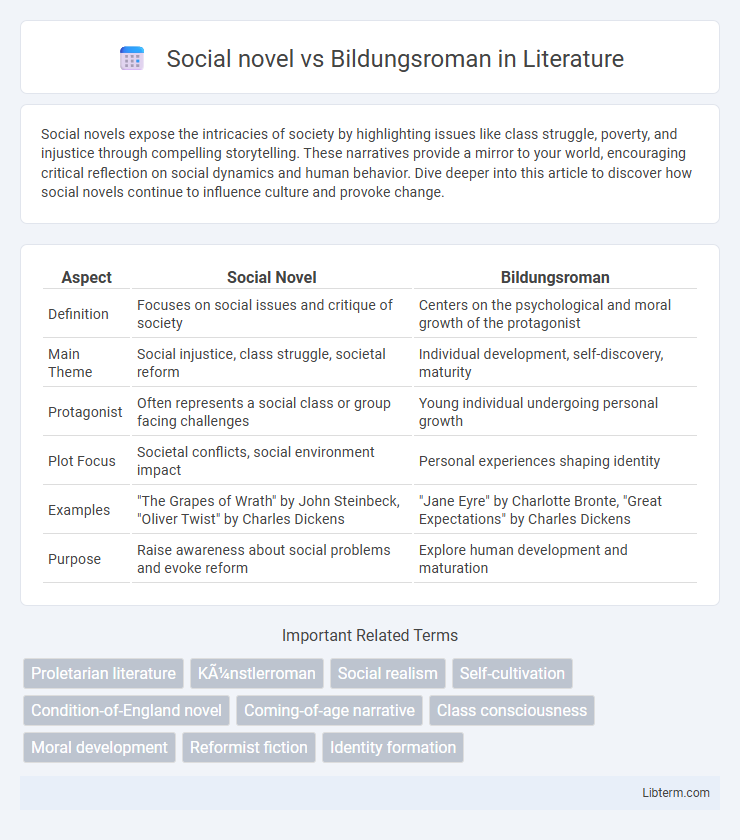Social novels expose the intricacies of society by highlighting issues like class struggle, poverty, and injustice through compelling storytelling. These narratives provide a mirror to your world, encouraging critical reflection on social dynamics and human behavior. Dive deeper into this article to discover how social novels continue to influence culture and provoke change.
Table of Comparison
| Aspect | Social Novel | Bildungsroman |
|---|---|---|
| Definition | Focuses on social issues and critique of society | Centers on the psychological and moral growth of the protagonist |
| Main Theme | Social injustice, class struggle, societal reform | Individual development, self-discovery, maturity |
| Protagonist | Often represents a social class or group facing challenges | Young individual undergoing personal growth |
| Plot Focus | Societal conflicts, social environment impact | Personal experiences shaping identity |
| Examples | "The Grapes of Wrath" by John Steinbeck, "Oliver Twist" by Charles Dickens | "Jane Eyre" by Charlotte Bronte, "Great Expectations" by Charles Dickens |
| Purpose | Raise awareness about social problems and evoke reform | Explore human development and maturation |
Defining the Social Novel
The social novel primarily addresses societal issues such as class conflict, poverty, and social injustice, using realistic settings and characters to critique and illuminate these problems. Unlike the Bildungsroman, which centers on an individual's psychological and moral growth, the social novel emphasizes external social conditions shaping characters' lives. Key examples include Charles Dickens's works, which expose Victorian social problems through vivid, empathetic portrayals.
Understanding the Bildungsroman
The Bildungsroman centers on the protagonist's personal growth and psychological development, capturing the transition from youth to adulthood through challenges and self-discovery. It emphasizes the formation of identity and moral understanding within a structured narrative arc that culminates in maturity. Social novels, while they may include character development, primarily focus on societal issues, highlighting cultural, economic, or political tensions rather than the internal journey of the individual.
Historical Origins and Development
The social novel emerged in the 19th century as a literary form aimed at exposing and critiquing social injustices, with key examples like Charles Dickens' works highlighting class disparities and industrialization's impact in Victorian England. The Bildungsroman, originating from the German term for "formation novel," developed in the late 18th century with Johann Wolfgang von Goethe's "Wilhelm Meister's Apprenticeship" emphasizing individual psychological and moral growth through personal experiences. While the social novel centers on societal structures and reform, the Bildungsroman focuses on the protagonist's internal development within a broader social context, both genres evolving through historical shifts in cultural and philosophical thought.
Central Themes and Motifs
Social novels primarily explore societal issues such as class disparity, political injustice, and economic struggles, emphasizing external conflicts and systemic critique. Bildungsroman centers on personal growth, identity formation, and moral development, highlighting internal conflicts and the protagonist's psychological evolution. Both genres use motifs like alienation and transformation, but social novels prioritize collective experience while Bildungsroman focuses on individual maturation.
Representation of Society and the Individual
Social novels emphasize the representation of society by critically portraying social structures, class conflicts, and cultural norms, often highlighting external forces that shape individual experiences. Bildungsroman focuses on the individual's psychological and moral growth, illustrating how personal development interacts with societal expectations and internal struggles. Both genres explore identity formation but differ in their balance between societal influence and individual agency.
Character Development: Collective vs Personal Growth
Social novels emphasize character development through collective growth, portraying individuals shaped by societal forces and group dynamics. Bildungsroman centers on personal growth, charting the protagonist's internal journey toward maturity and self-understanding. Both genres explore transformation, but social novels highlight communal influence while Bildungsroman focuses on individual psychological evolution.
Narrative Structure and Point of View
Social novels typically employ a third-person omniscient narrative structure that offers a broad societal perspective, emphasizing social issues and collective experiences. Bildungsroman narratives often utilize a first-person or close third-person point of view to trace the protagonist's psychological and moral development through a chronological life journey. The contrast in narrative structure and point of view reflects the differing thematic focuses: social novels prioritize external social environments, while bildungsroman centers on individual growth.
Social Critique vs Personal Identity
Social novels emphasize societal structures and injustices, using narrative to expose and critique issues like class disparity, poverty, and political corruption. Bildungsromans focus on the protagonist's psychological and moral growth, exploring personal identity formation and self-discovery within their cultural context. While social novels target collective social reform, Bildungsromans prioritize individual maturation and internal conflict resolution.
Notable Works and Authors
Social novels often explore societal issues and class struggles, with notable works including Charles Dickens' *Hard Times* and Elizabeth Gaskell's *North and South*. Bildungsroman, a genre centered on the protagonist's psychological and moral growth, is exemplified by authors like Johann Wolfgang von Goethe with *Wilhelm Meister's Apprenticeship* and Charlotte Bronte with *Jane Eyre*. Both genres offer rich literary contributions, with social novels emphasizing external social dynamics while Bildungsroman focuses on internal character development.
Contemporary Relevance and Adaptations
Social novels emphasize societal issues and class struggles, reflecting contemporary cultural and political climates, while Bildungsroman focuses on individual psychological growth and identity formation. Both genres inspire modern adaptations in film and television, with social novels influencing works that critique social systems and Bildungsroman shaping narratives centered on personal development and coming-of-age themes. Contemporary relevance is seen as social novels challenge systemic injustices, whereas Bildungsromans resonate with audiences navigating personal transformation in a complex world.
Social novel Infographic

 libterm.com
libterm.com